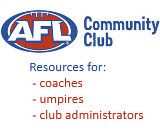Coaches - Managing Yourself
|
|
 By Peter Schwab
By Peter Schwab
AFL Director of Coaching
I believe before you can coach others you need to manage your own behaviour and show leadership.
Leadership is a lot of things but good leaders make good decisions every day. They also make a few critical decisions in major areas of their life and then manage those decisions on a day by day basis.
Below are a few areas we can self-manage to make us better coaches for others.
How to Self-Manage.
- Manage Emotions - This takes a lot of self-control particularly when you are angry or upset. When people do or say things which may upset you, stay calm and remember it isn’t about you it is about them. If you can see it from this point of view then you should be able to remain in control of your emotions and in fact be better placed to assist those who have angered or upset you.
- Manage Your Time - Until you value your time you won’t do much with it. Remember you pay for things with time. Think time not money and then ask yourself was it worth spending time doing what I just did. Another way to view time is through a to do list approach. Priority based lists are invaluable. No.1: Must do it and do it well. No.2: Must get it done. No.3: Could do it. This leads on to the next point in self management.
- Manage Priorities - Be ruthless in your judgement about what you should do. As a rule spend 80% of your time where you are strongest, 15% where you are learning and 5% in other necessary areas. We don’t have a choice when our leader says we must handle it, and then it’s the Nike slogan approach, “Just Do It.”
- Manage Energy - This is vital. No-one works well tired or run down. Be ready when you must be, be it a main event or an occasion where you absolutely have to be at your best. For a sportsperson it is when you have to perform.
- Manage Your Thinking - Give yourself time to think, otherwise you will never get to reflect on whether what you are doing is right or be able to strategise on what you could be doing to improve.
- Manage Your Words - Talk as they say is cheap, so whatever you say you must back with action. Also be clear every time you speak and you should say only what you want the other person to know so there is never any doubt about what you say. Never betray a confidence, but make sure that the person who is telling you something understands there are certain things you may be compelled to tell someone else. It forces them to make a judgement not you.
- Manage Your Personal Life - People are entitled to a private aspect to their life and most people will argue it is separate to their working or public life, but the best leaders are consistent in their behaviours at all times. Good leaders will make the best decision when faced with prioritising.
|
|
|





